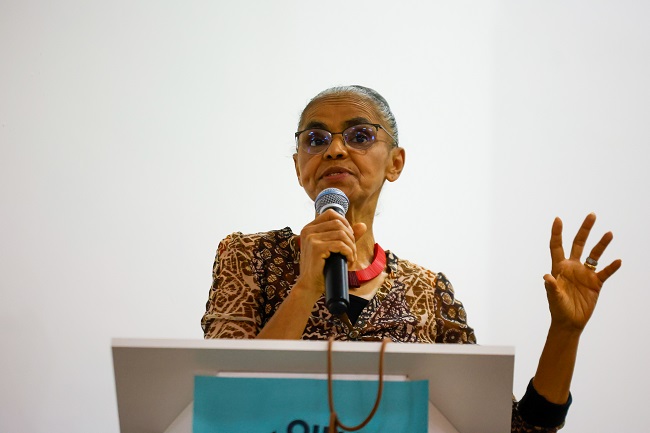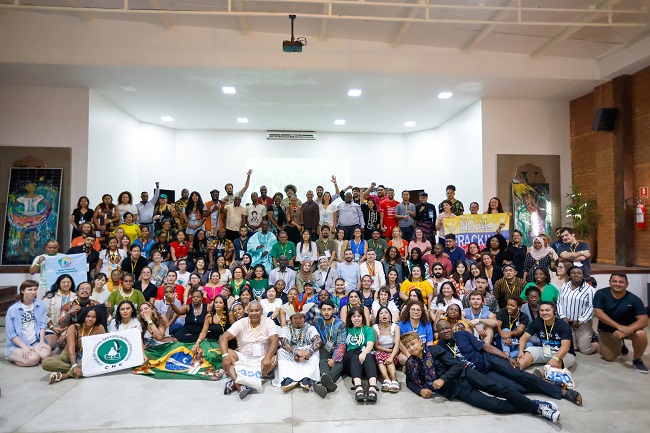Brazilian Environment and Climate Change Minister, Marina Silva, took part in the final day of the “Renew Our Power” event. The meeting, organised by 350.org, brought together over 200 climate leaders from over 70 countries to Brazil with the aim of driving forward the renewable energy transition, a strategic milestone towards COP30.

This year (2025), Minister Marina Silva is leading an organisation proposed by Brazilian President Lula called the “Global Ethical Balance”. According to the Brazilian government, this initiative will “promote dialogues in different regions of the world to reflect on how to align decisions with the non-negotiable goal of keeping global warming to 1.5°C”.
This year, during the Free Land Camp (ATL), Indigenous groups from the Amazon rainforest and the Pacific Ocean declared that “Indigenous and traditional community leadership, the just energy transition, direct financing and the integral preservation of forests, oceans and soils, is the starting point for any discussion on the Global Ethical Balance”.
Marina Silva’s visit to the event on Thursday, April 17, 2025, came days after dozens of the activists staged a peaceful protest with a giant banner made by the artist Mundano with ashes from Amazon wildfires to the doors of the Ministry of Foreign Affairs (Itamaraty Palace). The activists from around 20 different countries called for Brazil’s leadership at COP30 towards a just renewable energy transition.
The action called for a direct response to a letter delivered to the COP30 presidency during the Indigenous Free Land Camp (ATL), signed by more than 180 organisations from around the world and thousands of people from 98 countries in an online petition, demanding that the end of fossil fuels, the just energy transition and indigenous and traditional leadership be at the heart of COP30 decisions.
Marina Silva, Brazil’s Environment Minister, said: “We have to think about the root of the climate problem. Does anyone still not know that the root of the problem is the use of fossil fuels? Everyone knows that, it was even agreed at COP28 – now it’s implement, implement, implement.
“If we never plan, if we don’t make a road map, if we don’t set targets, if we continue to use fossil fuels, we won’t be able to move forward. In 2025 we’ll meet in Belém and we’ve already decided that given the imminence of the point of no return of the climate crisis, we’re going to implement what we’ve discussed over the last few decades.”
Marina Silva also spoke about the importance of implementing the renewable energy transition with traditional and Indigenous peoples at the forefront.
“Science can anticipate a lot, but we usually only consider the science of Western knowledge. There is another science, that of narrative knowledge, of ancestral knowledge, which says the same thing, but with a difference: it says it and does it. It does so because its experience is consistent with what it says. So, I want COP30 to also be a space for learning.
“What we need is a new perspective. It may sound dreamy, but it’s the only thing that will save us. It’s a good thing we have good teachers,” submitted Silva.

Cacique Ninawa, Huni Kui people, Brazil, said: “The Minister’s visit is a strong signal to the country and the world. We need political courage to recognise ourselves, eliminate the use of fossil fuels once and for all, accelerate a just energy transition and fund those who have done the most to tackle the climate crisis – we Indigenous and traditional peoples are the true climate authorities and guardians of the planet.”
Ilan Zugman, 350.org’s Director for Latin America and the Caribbean, said: “Minister Marina Silva’s visit to our event is a sign that the call is being heard – If we want to talk about an ethical balance this year, we can’t leave out the people who are most affected by the climate crisis and yet have the least responsibility for it.
“That’s why, this month, community leaders, activists and influencers from around the world have called for an end to fossil fuels, a just energy transition and indigenous and traditional community leadership to be at the centre of the COP30 discussion. We won’t accept anything less.”
George Nacewa, Pacific Climate Warrior and 350.org community organiser from Fiji, said: “This is a critical time for our people; the age of deliberation is long past. We need this year’s COP to be the one that spearheads the Just Renewable Energy Transition from words to action. It is now up to the Brazil COP Presidency if they heed the Indigenous and traditional climate leadership we have seen and heard in these last weeks or lock us into climate catastrophe.”
